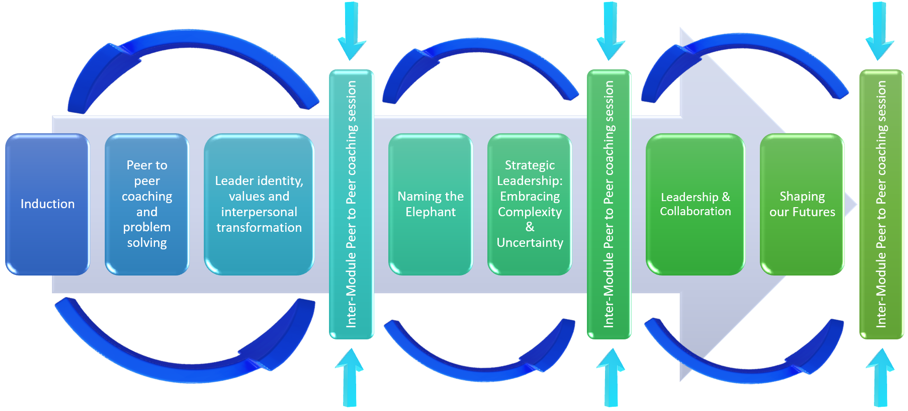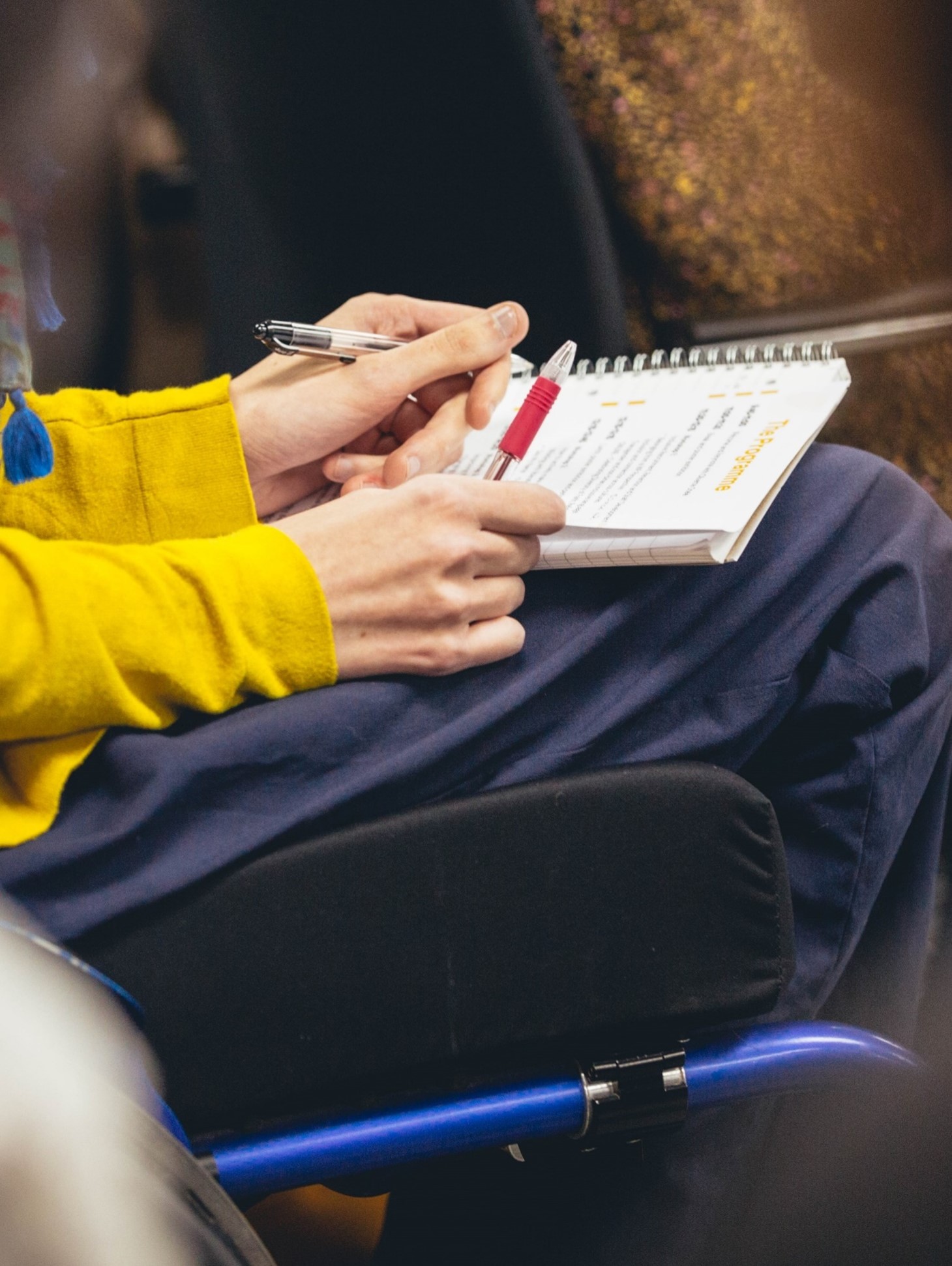About INspire

Welcome to INspire: Introduction from Stuart Croft, Vice Chancellor
I am excited to continue to the journey at Warwick to support a new kind of leader. Leaders who are inclusive, reflect the diversity of our communities, challenge traditional practices and inspire others to help us achieve our 2030 strategic objectives.
Diversity of thought is critical to Warwick as a place of innovation and creativity and that means we need diversity in our leaders as well as our students and staff. To support diversity to thrive at senior levels we are continuing to support the INspire programme which goes beyond leadership programmes. It is a personal development experience to facilitate future senior leaders to build personal and professional skills while navigating the challenges faced by people in minority groups to lead and inspire a diverse and inclusive Warwick community.
The programme is aimed at people already in senior leadership positions who aim to progress to top leadership positions. In the early stages we are inviting people who are under-represented in senior leadership positions but our vision is that eventually all or leaders will benefit from such an experience.
I hope that you are inspired to take part in this exciting opportunity to take your career to the next level.
With best wishes,




About the programme
Purpose
The aims of the programme and what you'll learn.
Aims
The programme aims to address documented challenges faced by leaders who are in the minority and who are different to the ‘traditional’ concept of a leader.
It will do this by exploring the following:
- Strategies to manage careers and prepare effectively for promotion opportunities.
- Leadership in the context of the future world of work.
- Managing organisational politics to build professional relationships and professional goals.
- Understanding the impact and challenges of being a leader who brings difference to the traditional leadership space and developing strategies for success (servant and transformational leadership).
- Being a role model for other minorities and building coalitions between different minority groups without being labelled ‘the diversity champion’.
- Managing the challenges for constant scrutiny and expectations around performance, style, micro-aggressions, and stereotyping.
- Understanding the challenges of working in a majority culture and retaining authenticity. Developing strategies to deal with others’ expectations of ‘leader’ behaviours and styles.
- Developing a sense of leadership purpose that aligns with one’s values and responsibilities while helping to develop authenticity and trustworthiness.
- Understand how to create space for learning, experimentation, and community (networks). Based on thinking that in general people are less likely to try out unfamiliar behaviours if they feel threatened, but this may be necessary for ‘minority leaders’ to help find and evolve their style.
- The programme will provide a peer group coaching relationship.
Learning outcomes
- Improve your understanding of the strategic context, and higher education’s evolving role.
- Developed an informed awareness of the leadership challenges of the future world of work.
- Assess your strengths and actively seek opportunities to build on your areas for development.
- Develop a deeper sense of self, personal and professional awareness and identity through transformative learning and reflective practice.
- Draw on the principles of values-based leadership to ensure strong leader presence and purpose.
- Increase your leadership effectiveness by developing your emotional intelligence so that you can apply different leadership styles to different contexts.
- Build influence (as a positive role model) through reciprocity (congruency and commitment).
- Confidently challenge norms, values and support the development of acceptable behaviours which support and promote a culture of inclusivity and tolerance.
- Demonstrate a developmental mindset open to working with discomfort, transition, and change.
- Engage consistently in reflective practice to enhance their experiential leadership learning as part of their preparation for more senior roles.
Programme structure
The key themes and activities on the programme.
Overview of structure
The image below provides an overview of the programme structure:

Each module will cover a core theme and will consist of:
- Pre-workshop activities,
- live facilitated interactive learning (workshops), and
- post-workshop activities.
Pre-workshop activities will include guided learning and reflection.
Post workshop activities will include:
- Video podcasts from leaders who have overcome organisational and personal leadership challenges.
- Reflective practice – themed reading and writing activities.
- Interactive discussion forum – to enable participants to learn with and from each other on achievements and challenges that emerge across the programme
The programme will also be delivered through peer-to-peer coaching. Participants will arrange to meet in pairs at least three times during the programme to support each other to work through specific challenges.
Workshop core themes
Additional activities
- 360 degree assessment.
- Three coaching sessions.
- Executive sponsor.
- Guest speakers.
- Executive dinner sessions.
- Experience leadership in a different sector.
Commitments
Our commitments to you and what we ask of you.
Our commitment
We will make sure that...
- You receive written joining instructions setting out preparatory activities that has to be complete before the live workshops, the themes covered in the workshop and the post workshop activities.
- The preparatory and post workshop activities provide clear and structured guidance in how to approach them.
- Listen to your feedback (particularly the responses collected as part of the questionnaires we will ask you to complete) which can help improve design and delivery of the programme on an ongoing basis.
- There is a safe and confidential safe space for you to share your experiences and have open and honest discussions about the challenges that you face as a leader.
- There are a range of learning, growth and development opportunities provided for both individual and collective learning, development, growth and reflection.
- A central portal (MyWBS) where you access all programme content (with the exception of the Reflective Journal.
- To respond to your queries, questions and suggestions in a timely manner.
- You are exposed to a diverse range of experienced leaders who will share their practice and lived experiences of tackling challenging issues whilst remaining aligned to their values and core beliefs.
- There is a central coordination contact where you can report back on any technical issues.
Your commitment
To make this programme work for everyone we ask you to commit to the following:
- To familiarise yourself with the design and structure of the programme.
- Understand when each module begins and prioritise your time.
- Fully engaging and committing to activities in live workshops.
- Building on your learning from pre-workshop and live workshop activities.
- Fully committing to engaging with and learning from your LEA 360.
- Preparing for and fully engaging in and set up regular face to face meetings with your sponsors.
- Fully engaging in the peer to peer coaching sessions.
- Developing your skills as a reflective practitioner.

The programme will be led by Dr Rob Worrall (pictured above)
- An award winning and highly experienced academic, researcher, and consultant in leadership, collaboration, and innovation, working at levels from emerging leaders to Board level.
- Since 2008, using his unique philosophy and design approach, Rob has created and delivered leadership development and collaboration initiatives across a wide range of sectors including public services, higher education, health, finance and manufacturing as well as inter agency collaboration on wicked issues such as urban violence prevention.
- Currently working in Kenya, Uganda, Ireland, UK, and the Middle East.
- Current roles include: Senior Associate at Roffey Park
Adjunct at the Graduate School of Healthcare Management, RCSI (formerly Institute of Leadership),
- Previous roles include Leadership and Management Specialist at the IPA, Dublin; Principal Lecturer – External Engagement, University of Sunderland. Programme Director for Leaders UK, Strategic Relationship Manager at the National School of Government.
- Rob also had 15 years’ experience in regional, national and international public sector senior level roles including Assistant Chief Executive of a Regional Assembly and Strategic Policy Adviser to the Office of the Deputy Prime Minister, UK.

Who’s the programme for
- Staff who are under-represented in senior positions. Our data identifies: disabled staff, women, LGBTQUIA+ staff, and staff who identify as ethnic minority.
- Academic and Professional Services staff who are currently at level 9.
Information drop-in
We'll be holding a drop in for people who are interested in applying to find out more: Monday 20 May, 12.30-1.30pm,link to join below.
Click here to join the meeting
Module Dates
Induction,11th September 2024:10.00am-16.00pm
Module 1, 9th October 2024: 10.00am-16.00pm
Module 2, 27th November 2024:10.00am-16.00pm
Module 3 ,8th January 2025:10.00am-16.00pm
Module 4,12th February 2025:10.00am-16.00pm
Module 5,11th March 2025:10.00am-16.00pm
Module 6, 14th May 2025:10.00am-16.00pm
Sessions with Piers Ibbotson
Personal Impact, Presence & different forms of Power
4th December, 9.30-13.00
19th February, 9.30-13.00
Dinner events
7th October 2024, 18.00-22.00
28th January 2025, 18.00-22.00
22nd May 2025 Challenge and Dinner, 18.00-22.00
INspire Leaders -Celebratory Event
5th June, 17.00-18.30
How to apply
A maximum of two page CV and a covering statement to include:
- A summary of your current role.
- Leadership issues and challenges for you, your department or subject area.
- Why you want to participate on this particular programme.
- Medium and long term leadership aspirations.
Please seek the support of your Head of Department before submitting.
This information will be used in the application and selection process.
The programme is limited to 12 participants. Please submit CV and supporting statement to
. Closing date for applications is 31 July 2024.


What is sponsorship?
An introduction to sponsorship.
What is sponsorship?
Sponsorship is a leadership development mechanism designed to offer a sponsoree many career benefits, including: opportunities to expand their network; exposure to senior executives; insight into the organisations culture; a clear understanding of the expectations associated with the pathway to leadership; and the backing of a senior leader or key influencer for an elevated and critically important role in the organisation.
Impact
According to a recent Deloitte report, individuals who have the active support of sponsors within their organisation are more likely to advance their careers. Sponsorship can improve the chances of stretch assignments, more promotions and pay raises by up to 30 per cent.
Research has shown that the impact of sponsorship is important for supporting diversity and inclusion efforts within an organisation (Catalyst & Audrey Murrell, University of Pittsburgh).
How is it different to mentoring?
The main difference between a sponsor and a mentor is that while a mentor might have regular catch ups, a sponsor will take charge of the professional experiences of the talent they sponsor and advocate for any and all opportunities.
Why is it important at Warwick?
Developing diverse future leaders is critical to the success of Warwick where through greater diversity of thought and an inclusive culture we achieve excellence with purpose in education and research.
Sponsorship roles
The role of sponsors/sponsorees.
Sponsorship is not an either/or role - either committing fully or not at all. It's a spectrum of different kinds and degrees of support.
- Mentor - Provide advice, support, or coaching.
- Stratigiser - Share 'insider information' about advancing; strategise getting ahead.
- Connector - Make introductions to influential people; talk them up with your peers.
- Opportunity giver - Provide a high-visibility opportunity.
- Advocate - Publicly advocate a promotion; fight for them in settings where they can't fight for themselves.
The role of sponsors
Sponsors or advocates…
- Believe in and go out on limb for their protégé.
- Use their organisational capital, both publicly and behind closed doors to support their protégés promotion.
- Support their protégés out of the box/risk taking ideas.
- Provide feedback and advice.
- Introduce their protégés to their networks.
- Are more than mentors.
- Seek to understand the diversity of your protégé and not seek to create a ‘mini-me’.
You can still be a great sponsor even if your protégés style of leadership is different to yours
The role of sponsorees
- Share with your sponsors your achievements and ambitions.
- Make sure they understand your skill set and experience.
- Deliver what you promise.
- Take responsibility for managing the relationship.
Benefits of sponsorship to the sponsoree
- Opportunities to expand networks.
- Exposure to senior networks.
- Insight into the Universities culture.
- A clear understanding of the expectations associated with the pathway to leadership.
- Backing of a senior leader or key influencer for an elevated and critically important role.
Hear from one of our previous sponsors:
"I have really enjoyed my time as a sponsor on the INspire programme. I hope I have helped share some knowledge and expertise on leadership in the University with the colleagues that I have worked with. Likewise, I have learned a great deal from those colleagues on how we need to keep improving as an organisation to be as inclusive, and thus as successful, as possible. I would encourage all colleagues to try the programme as being of tremendous benefit."
Chris Hughes, Pro Vice Chancellor (Education)
